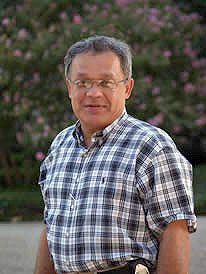Jan 24 2010
Lauded for his landmark advancements in nanotechnology, optics and the science of physics as a whole, Dr. Anvar Zakhidov from the University of Texas at Dallas has been named a fellow of the American Physical Society (APS).

Zakhidov's distinction, in the society's materials physics division, will be made public in the March 2010 issue of APS News. Members are nominated by their peers.
The nomination letter lauded Zakhidov's world-class experimental capabilities in materials research and materials applications. Zakhidov's ongoing list of accomplishments includes:
- Research to develop solar cells based on conjugated polymers.
- Breakthrough discoveries in the physics of molecular materials – particularly fullerene superconductors and organic devices.
- Continued advancements in carbon nanotube research.
"I am very honored with this recognition," Zakhidov said. "I look at it as recognition of all the successes of our Alan G. MacDiarmid NanoTech Institute."
Zakhidov's annual citations—a yardstick by which the quality of research is often measured—have increased in the past decade from about 200 per year to more than 800 annually. Thirty of his 240 publications have been cited at least 30 times.
"The American Physical Society limits the number of fellows to 0.5 percent of its membership," said Dr. Myron Salamon, dean of the School of Natural Sciences and Mathematics. "The naming of Professor Anvar Zakhidov as a fellow in the society is a distinct honor."
Dr. Ray Baughman, director of the NanoTech Institute and also an APS fellow, calls Zakhidov a "giant of physics."
"I, along with his many other friends in the scientific community, am so happy that Anvar has received this great honor," Baughman said. "He has made a host of seminal breakthroughs in diverse areas of science and technology and has achieved this by being a world-class experimentalist, theorist, leader and teacher."
Zakhidov graduated magna cum laude from Tashkent Technical University in Uzbekistan in 1975. He obtained his master's in physics in 1977 and doctorate in physics (optics) from the Institute of Spectroscopy of USSR Academy of Sciences in Moscow in 1981. He spent five years (1990-1995) as visiting professor in Japan, and a year in Bologna, Italy, at the Institute of Molecular Spectroscopy.
From 1996 March until July 2000, Zakhidov was a senior principal scientist working with advanced materials at Honeywell Inc. (formerly AlliedSignal), where he worked closely with Baughman. He joined UT Dallas in 2001 to co-found the NanoTech Institute. He serves as its associate director.